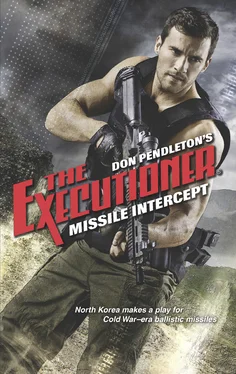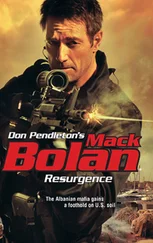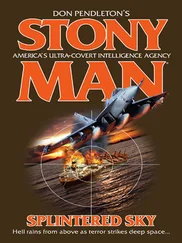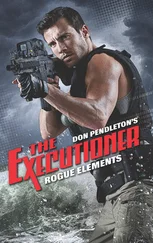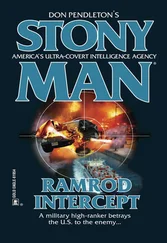“Want me to do a flyover to try to keep them on the ground?” Grimaldi asked.
“Go for it,” Bolan said.
Grimaldi buzzed the airstrip, flying directly in the path of the accelerating plane.
The craft jerked to the left, slowing appreciably. The side door flew open and a figure jumped to the ground. Thin streams of red fire zoomed upward.
Tracer rounds, Bolan figured.
The bodies of two marines lay in the field before him. No time to check them now, he thought. He was almost to the airfield.
“Whoever the hell that guy is,” Grimaldi said over the radio, “he can shoot. I’m taking fire, and it’s coming close.”
Bolan paused, acquired a sight picture of the hostile and squeezed off a quick burst. The man twisted in his direction, and the Executioner saw that he was Asian. Bolan fired again, and his target jerked slightly.
He was hit. The question was, how badly?
Seconds later the Executioner had his answer as red tracer rounds began zipping past him. He ducked, rolled to the left and came up on one knee just as the firing stopped. He acquired a sight picture and saw the hostile leaning back, his right arm extended behind him.
Grenade, Bolan thought, and didn’t hesitate. He shot the man, and seconds later the flash and concussion of an explosion washed over him, accompanied by a second, larger conflagration as the plane went up in a gigantic fireball.
Bolan keyed his mic and asked Martinez for a sitrep.
“We are secure inside,” the sergeant replied. “One prisoner.”
“Casualties?” Bolan asked.
“One of my men wounded. One KIA.” Martinez’s voice cracked when he said the last part. “Captain Ruiz has called for a medevac, and reinforcements to take control.”
Bolan frowned. Too many casualties. This had been a debacle.
He radioed Grimaldi, saying they had a wounded marine, and asking if he could set the chopper on the airstrip.
“No problem,” the pilot said. “You just get that marine over to me and I’ll fly him out.”
Bolan radioed the information to Martinez, who offered his thanks for Grimaldi’s assistance.
After the wounded man had been loaded into the chopper, with another of his comrades to direct the flight, Grimaldi lifted off.
Bolan tagged up with Martinez, who was standing near the rest of the team. A man in a bright orange short-sleeved shirt sat in the middle, his hands fastened behind his back, a briefcase on the floor in front of him. He was whistling softly, and when Martinez told him to shut up, he kept on whistling. Enraged, the sergeant walked over and slapped him across the face.
“Is that the best you can do?” the seated man asked in Spanish, then spit on the floor. “You are the dirt beneath my feet.”
Martinez cocked his hand back to deliver another blow.
“Sounds like he’s trying to get to you,” Bolan said. “He’s trying to bait you.”
“You are American?” the prisoner asked in English, looking at Bolan. “Yeah, you must be. You don’t have a mask on, like these cowards.”
Martinez kept his arm cocked for a few moments more, the expression of fury locked on his face, then he slowly lowered his hand and joined Bolan.
He leaned close and said in English, “I think he’s Cuban, from the sound of him.”
Bolan had the same thought, noticing the Cuban inflection.
“Yeah, you’re right, chief,” the prisoner said. “I am Cuban. And now let me talk to the man in charge.”
“I am in charge here,” Martinez said, turning toward him. “What do you want?”
“Not you,” the Cuban said. “The American. I’ve got information to trade. No way you can give me what I want.”
“And what might that be?” Bolan asked.
The Cuban leaned back and smirked. “A condo in Miami for starters.” He laughed. “You’re gonna be interested in what I’ve got to say.”
Bolan said nothing.
The Cuban smirked again. “American, you’re not gonna believe what I’ve got. No way. But it’s big. Real big.”
Bolan watched the man sitting there smiling, a look of total confidence on his face.
This could be interesting, he thought.
NIISA Headquarters
Adobe Flats, New Mexico
JAMES HUDSON WATCHED from the back of the auditorium. Dr. Phillip McGreagor, as he liked to be called, stood on the stage holding the microphone like a rock star, gesturing toward the ceiling-to-floor screen behind him as it depicted the white, streamlined rocket on the launchpad, braced by the accompanying assemblage. McGreagor had used every means at his disposal, from liposuction to Botox, to maintain his lean-and-mean, youthful appearance, and now he strode around shaking the dark crown of his expertly woven hairpiece.
“This, ladies and gentlemen,” McGreagor said, extending his hand toward the image, “is the future.”
Hudson thought it looked like an insignificant Roman candle waiting to blow, in contrast to the bleak mesquite-covered hills and distant mountains. He continued to watch as his boss spoke about the upcoming planned launch to his movie star friends, rich investors and a small, select group of reporters. Several professional photographers scurried around unobtrusively, snapping pictures, while others panned back and forth with cameras mounted on tripods. It was McGreagor’s show, and Hudson wondered which turned the rich son of a bitch on more, the spectacle or the actual thought of space travel.
“This is your chance, ladies and gentlemen,” McGreagor continued, “to be part of the future. To make what we see in the movies a reality.” He paused and milked the silence for all it was worth before adding, “You can get tickets for the first civilian, commercial trip into outer space, and have a time share in our fully inhabited station on the moon by the end of the decade.”
A murmur of excitement snaked through the audience. Hudson watched and listened as the images changed on the big screen behind McGreagor, first showing the previously depicted rocket blasting off and coasting comfortably in orbit. The computer-generated image alternated for a while with shots of Earth obviously borrowed from one of the actual space shuttle flights, then the sleek rocket was shown reentering the atmosphere and landing on a desert airstrip with the ease of a descending 747.
“We’re on track to have our first test flight in a few months,” McGreagor said, moving to the edge of the stage as the screen behind him filled with more images of the spaceship maneuvering through the skies and landing again and again. “Our reentry technology is this close—” he held up his thumb and index finger an inch apart “—to being completed. Thanks to the efforts of two of the greatest scientific minds of the past and current centuries.” He smiled and extended his arm toward the two older men, Terry Turner and Vassili Nabokovski, seated on the far side of the stage.
The audience applauded.
“This is your chance, ladies and gentlemen,” McGreagor said on the tail end of the fading applause. “Your chance to be part of the greatest adventure of our era. Your chance to be part of the New International Independent Space Agency, NIISA.”
More applause filled the auditorium.
The old son of a bitch has them eating out of the palm of his hand, Hudson thought. He’s already got more money than the US Mint, and these rich bastards are going to be lining up to give him more. Hudson shook his head. Too bad it would soon be time to rain on this little parade. But any regrets he might have had were vastly overshadowed by the thoughts of how rich he himself was going to be. All he had to do was play his hand right, and make sure everything went according to the plan.
He pressed his left arm against his side, feeling the comforting reassurance of the Smith & Wesson M&P 40L. It was a bit bigger than he needed, but it was a mean-looking piece of steel and polymer. Hudson never knew when McGreagor would pull him aside, in one of his braggadocio moments, and urge Hudson to show one of the movie-star idiots what “a real weapon” looked like. Thus, the larger frame .40-caliber pistol was an appropriate choice.
Читать дальше
